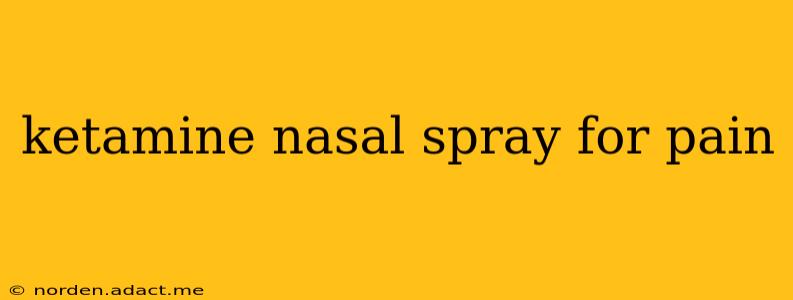Ketamine, once primarily known for its anesthetic and dissociative properties, is increasingly recognized for its potential in managing chronic pain conditions that haven't responded to other treatments. While traditionally administered intravenously or intramuscularly, the development of ketamine nasal spray offers a potentially more convenient and accessible route of administration. This guide explores the use of ketamine nasal spray for pain management, addressing common questions and concerns.
What is Ketamine Nasal Spray?
Ketamine nasal spray is a formulation of ketamine designed for intranasal administration. This means it's sprayed into the nostrils, where it's absorbed into the bloodstream through the nasal mucosa. This method bypasses the need for intravenous injections, offering a potentially less invasive and more convenient option for patients. However, it's crucial to understand that the formulation and dosage of ketamine nasal spray are strictly controlled and should only be administered under the supervision of a qualified medical professional.
How Effective is Ketamine Nasal Spray for Pain Relief?
The effectiveness of ketamine nasal spray for pain relief varies depending on several factors, including the specific type and severity of pain, the individual's response to the medication, and the dosage used. While research is ongoing, studies suggest that ketamine nasal spray can provide significant pain relief for some individuals suffering from chronic pain conditions that have not responded to other treatments. This is particularly promising for conditions like fibromyalgia, complex regional pain syndrome (CRPS), and neuropathic pain. However, it's not a universally effective solution, and not all patients experience the same level of benefit.
What Types of Pain Does Ketamine Nasal Spray Treat?
Ketamine nasal spray is being explored as a treatment option for various types of chronic pain, including:
- Neuropathic pain: This type of pain results from damage or dysfunction in the nervous system and is often described as burning, tingling, or shooting pain.
- Fibromyalgia: This condition is characterized by widespread musculoskeletal pain accompanied by fatigue, sleep disturbances, and cognitive difficulties.
- Complex regional pain syndrome (CRPS): This chronic pain condition typically affects a limb after an injury and is accompanied by swelling, changes in skin temperature and color, and reduced range of motion.
- Other chronic pain conditions: Ketamine nasal spray's analgesic effects are also being investigated in other types of chronic pain that are resistant to traditional treatments.
It's important to remember that ketamine nasal spray is not a first-line treatment for pain and should only be considered after other options have been tried and found ineffective.
Is Ketamine Nasal Spray Safe?
While ketamine nasal spray can be effective for certain pain conditions, it's essential to be aware of potential side effects. These can range from mild (such as nausea, dizziness, and drowsiness) to more serious (such as hallucinations, changes in blood pressure, and respiratory problems). The safety profile of ketamine nasal spray depends heavily on proper dosage, patient monitoring, and the careful selection of appropriate candidates by a qualified healthcare professional.
The risk of side effects can be minimized through careful patient selection, monitoring, and the use of appropriate supportive measures.
What are the Side Effects of Ketamine Nasal Spray?
As with any medication, ketamine nasal spray can cause side effects. Some common side effects include:
- Nausea and vomiting: This is a relatively common side effect, often manageable with anti-nausea medication.
- Dizziness and drowsiness: Patients should avoid driving or operating machinery after receiving ketamine nasal spray.
- Increased blood pressure: This is usually transient but should be monitored, especially in patients with pre-existing hypertension.
- Hallucinations and disorientation: These are less common but more serious side effects, and the risk can be minimized by careful patient selection and monitoring.
- Respiratory depression: This is a rare but potentially life-threatening side effect, requiring careful medical supervision.
The severity and frequency of side effects vary from person to person. It's crucial to discuss potential side effects with your doctor before starting treatment with ketamine nasal spray.
How is Ketamine Nasal Spray Administered?
Ketamine nasal spray is administered under the strict supervision of a healthcare professional in a controlled medical setting. The exact dosage and frequency of administration will vary depending on individual needs and the severity of the pain condition being treated. The administration process itself is relatively simple, involving spraying a measured dose of the medication into the nostrils. Patients are typically monitored closely after administration to observe for any adverse reactions.
Who Should Not Use Ketamine Nasal Spray?
Ketamine nasal spray is not suitable for everyone. Individuals with certain medical conditions, such as severe heart or lung problems, untreated psychosis, or a history of substance abuse, may not be good candidates for this treatment. A thorough medical evaluation is necessary to determine if ketamine nasal spray is a safe and appropriate treatment option.
This information is for educational purposes only and does not constitute medical advice. Always consult with a qualified healthcare professional before starting any new treatment, including ketamine nasal spray, to determine if it's appropriate for your individual circumstances.
